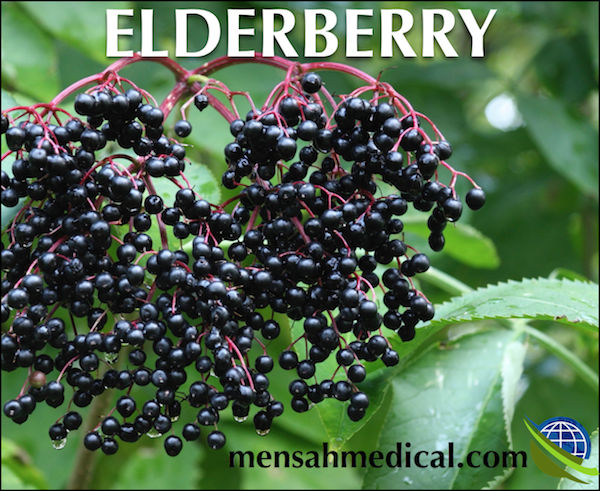Elderberry, also known by its botanical name, Sambucus Canadensis, is a small tree in the honeysuckle family that is also an anthocyanin with powerful antioxidant properties. It is a small tree that is often planted by landscapers due to its beautiful clusters of white flowers and ornamental berries. The elderberry is a native North American plant that can be grown in just about any seasonal climate.
There are many species of elderberries but the black elder is the most common for medicinal use. The berries are very bitter and should not be eaten raw because when uncooked they contain a chemical similar to cyanide. For many generations, herbalists have used cooked elderberries as a healing agent. It is known to be both an antiviral as well as cancer-fighting botanical. Elderberry is generally available as a liquid, a syrup, and in capsules and lozenges. There are two common medicinal brands: Sambucol and Sinupret.
Elderberry seeds have amygdalin, which is also known as vitamin B17. Amygdalin is a compound that many believe is good for cancer prevention. Elderberry is also known for its flavonoids, which stimulate the immune system and have antioxidant properties that can help prevent free radical damage.
Use with Cold and Flu Symptoms
Elderberry is known for its antiviral properties. It can be applied to the skin as well as taken orally to treat respiratory illnesses like the common cold and flu. It may reduce congestion and is commonly used in combination with vitamin C.
Precautions
Elderberry can trigger side effects and interact with other herbs, supplements, or medications. For these reasons, you should take elderberry only under the supervision of your health care provider. It is only recommended to use Elderberry for about 5 days because studies of long-term use have not been done and it’s unknown if taking elderberry supplements are safe when used for long periods of time. If you consume the leaves, stems, unripened fruit, or raw fruit of the Elderberry plant it will likely cause nausea, vomiting, or diarrhea and is considered unsafe.
Pregnancy and breastfeeding
Pregnant and breastfeeding women should not take elderberry. It’s a very strong immune booster, and a Stanford medical study proved that a pregnant woman’s immune system will actually overreact to the flu, rather than react sluggishly. This means that elderberry might not be the best first choice if you are pregnant because it will overstimulate your immune system.
Autoimmune disorders
Patients with autoimmune diseases like rheumatoid arthritis, celiac, Hashimoto’s, and lupus need to consult a physician before taking elderberry because it will stimulate their immune system. Elderberry interferes with medications that suppress the immune system and medications used to treat autoimmune diseases.
Hypertension
Patients on diuretics for hypertension, congestive heart failure, and renal issues need to consult their physician before taking elderberry. In general, diuretics help the body get rid of excess fluid and increase the amount of urine a person produces. Elderberry can also act as a diuretic, so patients on a diuretic while taking elderberry to run the risk of dehydration.
Diabetes
Patients with diabetes must consult their physician before taking elderberry because it may lower blood sugar levels. Patients on prescription medication for diabetes who take elderberry may develop hypoglycemia, which is also known as low blood sugar.
Chemotherapy
Elderberry can interact with certain chemotherapy drugs. If you are undergoing chemotherapy, ask your oncologist before taking elderberry.
Asthma
Elderberry counteracts the effectiveness of certain drugs for asthma and other respiratory conditions. This means that the prescribed medication will have less potency when taken with elderberry.
Resources
- Kong F. Pilot clinical study on a proprietary elderberry extract: efficacy in addressing influenza symptoms. Online Journal of Pharmacology and Pharmacokinetics. 2009;5:32-43.
- Wright CI, Van-Buren L, Kroner CI, Koning MM. Herbal medicines as diuretics: A review of the scientific evidence. J Ethnopharmacol. 2007 Oct 8;114(1):1-31.
Albert Mensah, MD, BCIP
As a physician in this specialized field since 2005, Dr. Mensah, board certified in integrative pediatrics by the American Association of Integrative Medicine, has treated over 3,000 patients with advanced targeted nutrient therapy. He serves on the board at Walsh Research Institute and serves as a clinical instructor for WRI’s international doctor training programs around the world. Dr. Albert Mensah received his undergraduate degree from Northwestern University (Evanston, Illinois) and his medical degree from Finch University of Health Sciences-Chicago Medical School. Dr. Mensah’s residency was in Family Medicine at Swedish Covenant Hospital (Chicago). Following residency, he completed additional fellowship training in academic development at JHS Cook County Hospital (Chicago). From 2005 to 2008, Dr. Mensah treated patients at the former Pfeiffer Treatment Center, a not-for-profit organization and outpatient clinic specializing in the treatment of biochemical imbalances including children with autism. Prior to joining Pfeiffer, Dr. Mensah was a physician at Melrose Park Clinic in Illinois. Dr. Mensah co-founded Mensah Medical in 2008 with Dr. Judith Bowman.



